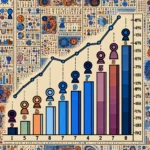Unlocking the Mysteries of the Genius Mind: What’s the Highest IQ Possible?
When we delve into the fascinating realm of human intellect, one question that often sparks curiosity is: what is the highest possible IQ score someone can achieve? In unravelling this enigma, we tread through the terrain of mental acumen, where benchmarks of brilliance are set and sometimes exceeded by extraordinary individuals.
The Intelligence Quotient, or IQ, is a measure of a person’s cognitive abilities in relation to their age group, evaluated through standardized testing. While the average IQ score hovers around the 100 mark, it’s the outliers that captivate our imagination—those prodigious minds whose intellectual capacities soar beyond the average confines.
One name frequently surfaces in discussions about peak IQ scores—Marilyn vos Savant. Crowned with an IQ score of 228, according to the Guinness Book of World Records, vos Savant has become synonymous with mental prowess. Her achievement compels us to question just how high the IQ scale can stretch.
IQ tests are designed with a mean score of 100, and a standard deviation, typically either 15 or 16, depending on the test being used. Scores are adjusted so that one standard deviation is either 15 or 16 points above or below the mean. Thus, a score of 130 or above is classed as ‘very superior intelligence’, placing the individual in the top 2% of the population.
It’s imperative to acknowledge that different tests have varying upper limits. For instance, the Cattell III B test has a ceiling of 162, equating to a profoundly gifted level, while the Stanford-Binet test maxes out at 160. The ceiling for scores on the Wechsler scales rests somewhat higher, extending to 200.
Venturing beyond the confines of standard testing, the rarified zone above 200 is where conjecture begins to mingle with confirmed results. Scores in this stratum are typically extrapolated or estimated, relying on a more theoretical approach to gauging intellectual capacity rather than direct measurement.
These exceptional instances have sparked debate amongst psychologists and psychometricians regarding the reliability and meaning of such extreme scores. Critical voices within the field suggest that once you move into the region beyond standard deviations accounted for within the population, the precision and relevance of IQ scores may diminish.
Therefore, the quest to pinpoint the pinnacle of IQ scores navigates speculative territory, where numbers become less representative of real-world cognitive abilities and more indicative of statistical artifacts.
It’s also worth considering that high IQ scores, while impressive, don’t necessarily equate with success, creativity, or emotional intelligence. A more holistic approach to understanding intellect recognizes the multifaceted nature of human abilities, where creativity, emotional depth, practical skills, and adaptability play equally crucial roles in shaping an individual’s contributions to society.
In conclusion, while it’s tempting to fixate on the highest possible IQ score, it’s the harmonious blend of various intelligences that truly encapsulates the genius mind. As we continue to explore the upper echelons of cognitive measurement, remember that it’s the impact and application of intelligence in the real world that ultimately defines brilliance.

